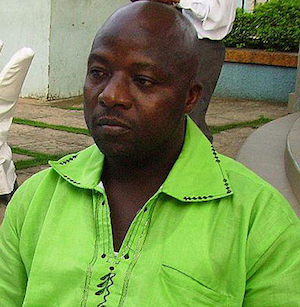Being both a Congressman and a former judge, Ted Poe (R-TX) is quite conversant with the law, and he has been reminding the executive branch that the President has the power to shut down travel from the ebola-swamped nations of west Africa under 42 U.S.C. Title 42 Sec. 265. The statute basically says that when the United States is endangered by communicable disease from abroad, the President can end travel from the affected area see actual wording below.
The only problem is convincing the President that his first duty is to protect the American people, not send 3000 troops to Africa to set up free-to-them hospitals. In fact, it appears the White House plan is to inconvenience citizens rather than block potentially infectious Africans, according to the Daily Mail: Americans set to face increased screening at airports amid Ebola crisis.
Poe discussed the African ebola threat with another judge recently:
 As a Texas congressman, Poe became alerted when Ebola Tom (pictured), the Liberian medical moocher, arrived in Dallas on a travel visa to get first-world healthcare.
As a Texas congressman, Poe became alerted when Ebola Tom (pictured), the Liberian medical moocher, arrived in Dallas on a travel visa to get first-world healthcare.
Poe got media attention because of his press release and letter to the head of the Centers for Disease Control:
POE: Cease Travel to Affected African Nations until the Ebola Threat Is Contained, Press Release, October 1, 2014
WASHINGTON, D.C.—Today, Congressman Poe (TX-02) sent a letter to Dr. Frieden, Director of the Center for Disease Control (CDC), regarding the recently confirmed case of Ebola in the United States. In the letter, Poe calls on the CDC to recommend that the President invoke his authority under 42 U.S.C. Title 42 Sec. 265 to prohibit non-essential travel to Sierra Leone, Liberia and Guinea by all American citizens, resident aliens, and foreign nationals attempting entry into the United States, until this current outbreak is brought under control.
“The health of our citizens should be the main priority of our government,” said Rep. Poe. “Fortunately, there is a law already on the books with the very purpose of containing the spread of diseases into our country. The time to invoke this law to ensure Americans are not exposed to this deadly disease is now, not after the disease is spread even further within our borders.”
LETTER
Dear Dr. Frieden,
It is a serious concern for my constituents and I that there is now a confirmed case of Ebola in Dallas, Texas. While I am confident that the health practices that are in place in the United States will be effective to prevent a major outbreak, I remain concerned that it appears that Americans are still making non-essential trips to the affected areas despite the public warnings against such travel.
I believe that the recent Ebola case in Dallas highlights the fact that non-essential travel to the affected region is putting Americans at unnecessary risk. I have nothing but respect for the American military and medical volunteers that are operating in Liberia and the affected region right now. I am confident that the proper procedures have been put in place to prevent transmission to and from those groups. However, I do question why other Americans not in these groups would still travel to the region and whether or not they could become infected and bring the infection home with them.
Given the severity of this threat, I request that the Centers for Disease Control consider recommending to the President that he use his powers under 42 U.S.C. Title 42 Sec. 265 to prohibit non-essential travel to Sierra Leone, Liberia and Guinea by all American citizens, resident aliens, and foreign nationals attempting entry into the United States, until this current outbreak is brought under control. The health and safety of the American population should always be the primary consideration in situations like this.
Sincerely,
TED POE
Member of CongressSTATUTE
42 U.S.C.
United States Code, 2011 Edition
Title 42 THE PUBLIC HEALTH AND WELFARE
CHAPTER 6A PUBLIC HEALTH SERVICE
SUBCHAPTER II GENERAL POWERS AND DUTIES
Part G Quarantine and Inspection
Sec. 265 Suspension of entries and imports from designated places to prevent spread of communicable diseasesFrom the U.S. Government Printing Office, www.gpo.gov
§265. Suspension of entries and imports from designated places to prevent spread of communicable diseases
Whenever the Surgeon General determines that by reason of the existence of any communicable disease in a foreign country there is serious danger of the introduction of such disease into the United States, and that this danger is so increased by the introduction of persons or property from such country that a suspension of the right to introduce such persons and property is required in the interest of the public health, the Surgeon General, in accordance with regulations approved by the President, shall have the power to prohibit, in whole or in part, the introduction of persons and property from such countries or places as he shall designate in order to avert such danger, and for such period of time as he may deem necessary for such purpose.
(July 1, 1944, ch. 373, title III, §362, 58 Stat. 704.)Transfer of Functions
Office of Surgeon General abolished by section 3 of Reorg. Plan No. 3 of 1966, eff. June 25, 1966, 31 F.R. 8855, 80 Stat. 1610, and functions thereof transferred to Secretary of Health, Education, and Welfare by section 1 of Reorg. Plan No. 3 of 1966, set out as a note under section 202 of this title. Secretary of Health, Education, and Welfare redesignated Secretary of Health and Human Services by section 509(b) of Pub. L. 96–88 which is classified to section 3508(b) of Title 20, Education.Delegation of Functions
For assignment of functions of President under this section, see section 3 of Ex. Ord. No. 13295, Apr. 4, 2003, 68 F.R. 17255, set out as a note under section 264 of this title.